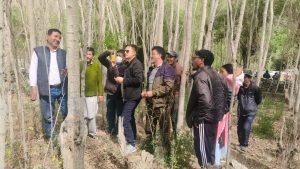Forest Department Kargil and KVK Kargil hold awareness camp on Pheosia Albivertex management on poplar trees.

Forest Department Kargil and KVK Kargil hold awareness camp on Pheosia Albivertex management on poplar trees.
Kargil, June 24, 2024: Forest Department Kargil in collaboration with Krishi Vigyan Kendra, Kargil conducted a one-day awareness camp on management of Pheosia Albivertex on poplar trees at Ashina on June 23, 2024. The outbreak of this pest was initially noticed through a video circulated on social media.
Scientists from KVK Kargil and officials from the Forest Department visited the site and urged villagers to take immediate action to prevent further damage.
The event was attended by Sajjad Khan, Councillor, Saliskot; Dr Mohammad Mehdi, Principal Scientist KVK Kargil; Niyaz, Range Officer, Kargil; officials from Forest Department; Lambardar and villagers from Ashina.
The Councillor addressed the gathering, assuring complete support from the Council to manage the pest. He requested the general public to cooperate with KVK and the Forest Department to control the insect.
Dr Mehdi provided a detailed briefing on the insect, its nature of damage, and the potential economic losses if not managed promptly.
He emphasized that the poplar tree is a main source of livelihood in the region, and failure to manage the pest could lead to its spread to adjoining areas, making it more difficult to control. The management of the insect is difficult without support and cooperation of the general public of the village.
He explained that the insect is a defoliator that voraciously feeds on poplar leaves, causing complete defoliation of the tree. The management practices recommended by Dr Mehdi include:
1. Sanitation of infested areas by collecting the larvae using brooms from the branches and destroying it.
2. Spraying: Apply Bacillus thuringiensis (Bt) at a concentration of 50 ml per 10 liters of water on initially infested trees, avoiding completely defoliated trees and waiting period must be for 6 hours to get effective results and the spray must be avoid during the rainy day.
3. Flooding of water on the infested area will collect the larvae at some corner which will further help to destroy the 4th instar larvae.
4. Collection and destruction of pupae during autumn and winter season 5. Installation of light trap in April May.
Niyaz, Range Officer from Forest Department in Kargil, organized all the necessary equipment and Bacillus thuringiensis from the department. He assured that the entire area would be covered, but emphasized the need for support from the general public.
Ismail Lambardar of the village expressed his gratitude for the prompt support from the Forest department Kargil in arranging necessary equipment and assured his and villagers support to the department for the management of the insect and further thank all the officials of both KVV and forest department for coming all the way on Sunday for the camp.
In the end, Bacillus thurengensis (BT) @ 50ml/10 ml were sprayed on the initially infected trees using power sprayer and coved an area of 1 hectare and which will continue next day to covered most of the infested areas.


